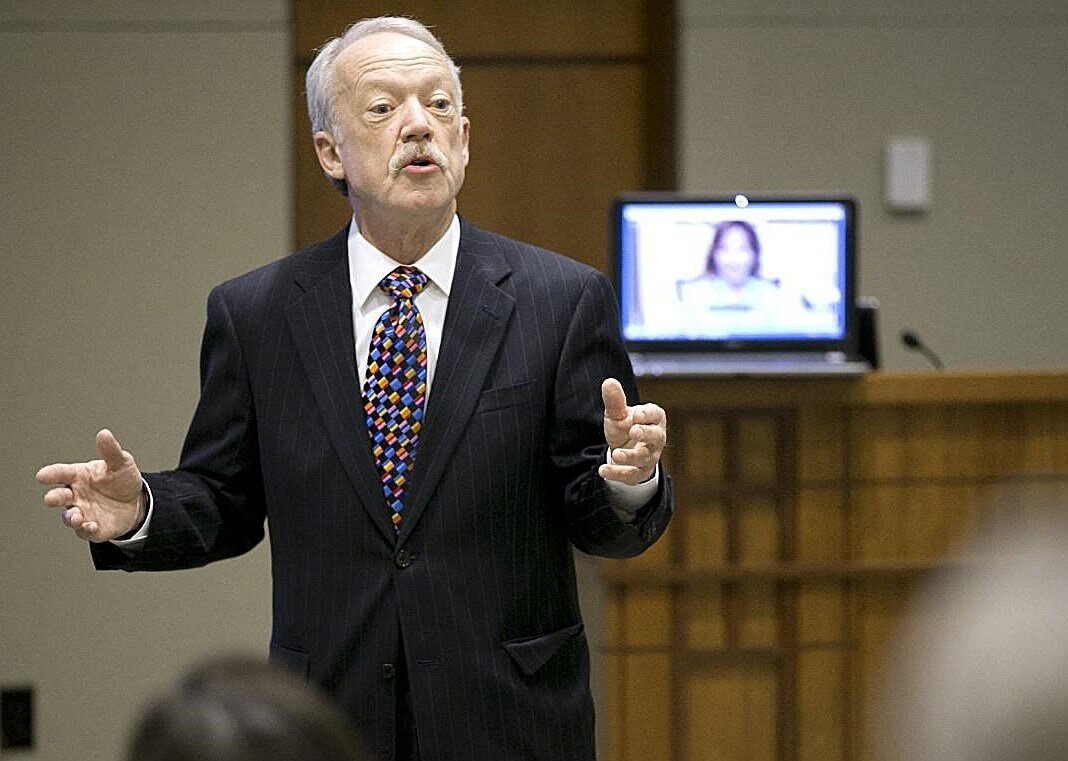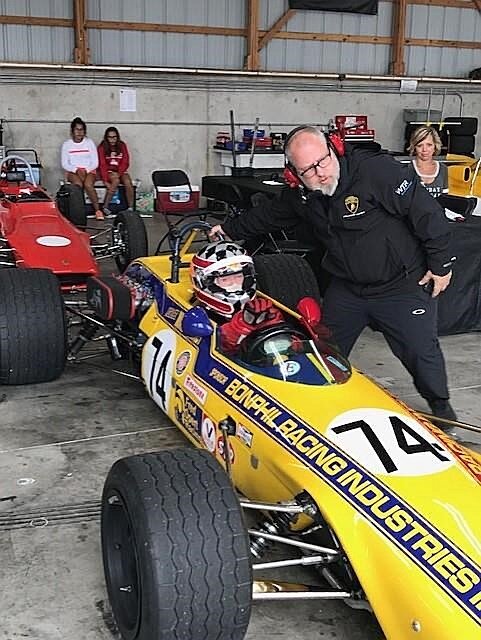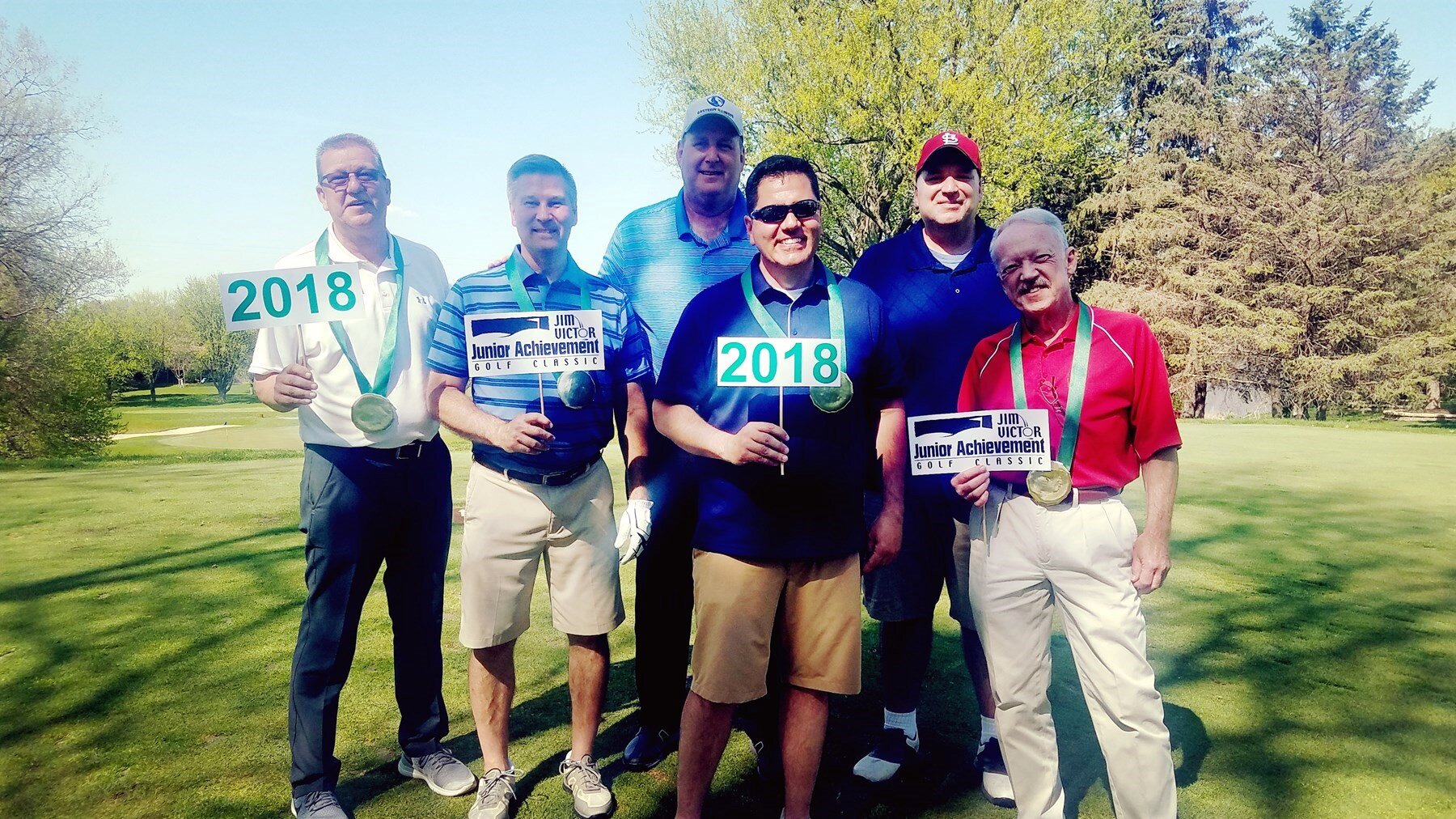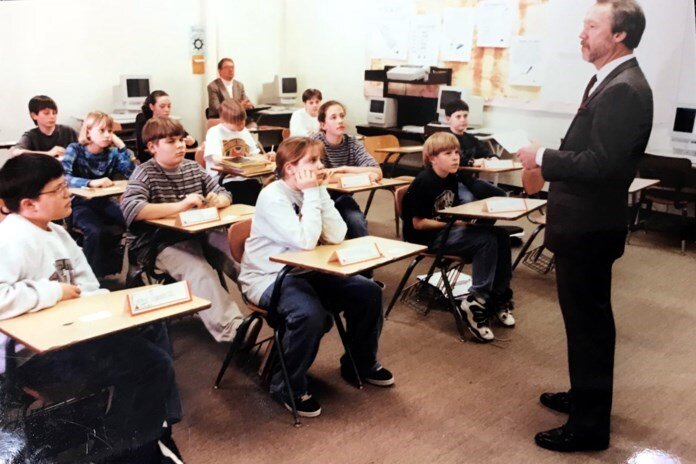The events of the last two weeks…
James “Jim” Victor Leaves a Lasting Legacy at Iowa Xi
(July 29, 1946 —July 27, 2018)
James “Jim” William Victor (Iowa Xi, 1965) of Davenport died in a tragic motor sports accident in July 2018. His example of planned giving is a model to inspire all Phi Kaps.
Jim Victor (Iowa State University, ‘68) was known as a top-notch investment advisor in the Quad Cities of Davenport and Bettendorf, Iowa, and Moline and Rock Island, Illinois, but he was undeniably more. A motorsports racer, a newspaper carrier, an altar boy, a fraternity brother, a newspaper columnist, a television personality, a philanthropist... the list can continue.
The son of Al and Marjorie (Pirk) Victor, Jim was born in Wisconsin but made his name in Iowa. In describing Jim, his Iowa Xi fraternity brother and fellow Morgan Stanley investment advisor Jim Willer recalled Victor as a “true, true friend.”
A MARION, IOWA, BOYHOOD
James William Victor was one of five children with sisters Barbara and Mary Anne and brothers Tom and Mick. His father Al took a job with Collins Radio in Cedar Rapids in 1956. The family lived in the nearby community of Marion where Jim attended St. Joseph School and served as an altar boy. He played piano and performed in the 1957 and 1958 recitals at St. Joseph. In a 1960 Cedar Rapids Gazette profile of Jim as one of their newspaper carriers, 14-year old Jim stated that he wished to become an architect, though he did not know which college he might attend. He attended the local Catholic high school Cedar Rapids Regis and used his newspaper profits to pay tuition, purchase his clothes and keep a bit of spending money. As a teenager, he “took care of his own financial affairs.”
JAMES IN AMES
Jim came to Iowa State University in the fall of 1964. He pledged Phi Kappa Theta and was initiated in the spring of 1965. He served as house social chairman and worked hard to get the men of Phi Kappa Theta to learn fraternity songs and serenade sororities. He made sure the men knew the songs of Phi Kappa Theta including “The Sweetheart of Phi Kappa.” He initiated social gatherings, including an Easter Break party at his family home in Marion for college friends. He loved interacting with others.
Victor, shown in this 1966 photo, joined Phi Kappa Theta in the fall of 1964. He said that his time at Iowa State University changed his life. (Courtesy of Iowa State University Bomb).
As a senior at Iowa State, he served as president of the Newman Club, the Catholic student organization, and was on the Interfraternity Council Board. He was a member of the Science & Humanities College’s Science Council and the Homecoming Central Committee. He was invited to join Alpha Kappa Psi, the national business honorary.
A MULTIMEDIA INVESTMENT ADVISOR
One of Jim’s first jobs out of college was with Iowa-Illinois Gas and Electric Company in the Quad Cities. In the early 1970s he started working as an investment advisor. He became prominent in the community and trusted in his knowledge. Victor wrote a regular column for the Quad City Times and later appeared on KWQC. He created a stock index of Quad Cities’ businesses that appeared in the paper. He was on the station’s first morning show and was a genial personality with a welcoming laugh.
Jim wrote a regular column on finances for the Quad City Times. Readers knew he was writing with an informed and beneficent perspective. (Courtesy of the Quad City Times)
QUAD CITIES & BEYOND
Jim continued to enjoy socializing. He maintained friendships and developed new ones. He met people in the Quad Cities and joined a local ski club. He traveled to Europe with the club and took annual trips to Colorado. A favorite memory of Iowa Xi brother Jim Willer’s was a 1972 trip to Council Bluffs for a wedding of a Phi Kap and an Alpha Chi Omega. The group then traveled north to visit college friend Diane Pattee’s family in the northwest Iowa town of Pocahontas. Willer recalled it was like the film, The Big Chill, though it followed a wedding, not a funeral. The group sang popular songs including “Joy to the World” by Three Dog Night and reveled in each other’s company. It was hard for the group to separate. Some, including Pattee, Willer and Victor, would remain lifelong friends.
A CREATURE OF HABITS
Jim got his rest, but when he was awake, he was focused. He read about new stocks or researched those that might be in trouble. He took his daily run and drank plenty of water. He attended one Iowa State Cyclone football game a year. He valued relationships. He never owned a smartphone, but he would gladly talk to friends and clients on a cellphone. His business partner Sheila Volrath told the Quad City Times, “He utilized his time to help people, whether it was with our business, his clients, other folks in the office, his family, his friends, but most importantly his volunteer work.” His obituary asserted, “Being together, loving life, never losing your childhood enthusiasm, staying committed to your principles and continually searching for the magic in even the smallest moments. This is how Jim lived.”
MOTORSPORTS
Jim participated in the Sports Car Club of America (SCCA) with the “Arms Up Racing” team. He had a B 17 Chevron Formula 3 racing car and often finished on the podium. He participated in a 24 Hours of Daytona racing team in 2004 as part of a five-man team that finished 13th in the Super Grand Sport class in a Corvette. His racing friends were stunned when he was killed in a crash during practice at Elkhart Lake, Wisconsin on July 27, 2018. A fellow racer commented on Facebook, “Jim was one of the nicest men I’ve ever met in racing. He was as fierce as any competitor once the visor shut. He will be missed.”
Among his philanthropic interests was Junior Achievement, the organization’s annual fund-raising golf tournament in the Quad Cities was named in his honor. (Courtesy of the Victor Family)
CHAPTER ETERNAL
“Give, expecting nothing thereof.”
Jim Victor lived the Phi Kappa Theta motto. He supported Junior Achievement in the Quad Cities where the annual fund-raising golf tournament is named in his honor. He created a scholarship at Iowa State. In Jim’s will, he bequeathed to Iowa Xi one of the largest posthumous gifts to a Phi Kappa Theta chapter ever.
When describing their brother, his siblings named the following traits: curiosity, engagement, children, learning, and family. Jim explained his time at Iowa State saying, “My experience at Iowa State truly changed my world – it enlightened me, it inspired me, and it empowered me.”
Jim was a model Phi Kap in life and in death. He embodied the leadership, fraternal, intellectual, social and spiritual values of Phi Kappa Theta. The men of Iowa Xi are proud to have known Jim as a fraternity brother and friend. His legacy will continue to help develop and define Phi Kaps at Iowa State for generations to come.











A resolution was passed by the Phi Kappa Theta Foundation in January to honor Brother James Victor.
2019-2021 Undergraduate Advisory Committee Announced
During the 2019 Convention in Austin, TX, the following brothers were elected to the Undergraduate Advisory Committee (UGAC).
2019-2021 UGAC MEMBERS
Great Lakes Province - Drew Clark (Trine University, ‘21) - UGAC Chairman
Mideast Province - Ross Aguilar (Duquesne University, ‘21) - UGAC Vice Chairman
Western Province - Chase Barbre (Washington State, '21)
Southern Province - Rian Baxter (Georgia Tech, '20)
Northeast Province - Carter Barnickel (Bridgewater State, '20)
Midwest Province - Charles Burke (Iowa State, ‘21)
ABOUT UGAC
Through peer representation, communication, and education this body empowers collegiate members within the fraternity. In addition, the UGAC will advise the fraternity’s elected or appointed leadership and general membership on programs and policies of the National Fraternity.
Contact UGAC
If you’d like to connect with the UGAC, you can email them here.
Additionally, the UGAC is supported by volunteers and staff members throughout their term.
UGAC Advisor - Wade Henderson (Washington State, '95)
Staff Liaison - Johnny Hohenstein (Belmont Abbey, '12)
THE ELECTION PROCESS
Undergraduate Advisory Committee members are elected every other year during Convention, and serve a two-yer term. Each province has one UGAC member to act as liaison between chapters and the Executive Office, and provide support and accountability to members. Two of the elected UGAC members are elected to serve as chairs on the Board of Trustees.
In order to be eligible to serve, the candidates had to:
Be present at convention,
Have been an initiated member for at least one (1) year,
Be a registered undergraduate for at least one year of term (UGAC members can serve as a graduate, but can not run for the position as an alumnus),
Be in good academic and judicial standing with their host institution, and
Be able to attend regional and national meetings (BBLAs, Convention, Conferences, etc.).
During convention, provinces met in break-out sessions to review nominations, accept nominees from the floor, and elect their representative.
Making Resolutions?
Plan for your Role as Chapter Leader!
by Dan Bureau, PhD
University of New Hampshire, ‘95
Board of Trustees
Assistant Vice President for Student Affairs at the University of Memphis
Resolutions are often made the end of one year and the beginning of the next because people are scientifically proven to be ready for change. There is a mindset that comes with making resolutions: I have not achieved my goals in the past year (or years) but now I feel ready to make that change. When considering what changes you need to make, also give pause to how those changes will ultimately impact those around you and what strategies you need to enact in order to achieve those goals.
As you consider some of your resolutions for 2019, think about what you need to do relative to your role in Phi Kappa Theta. Leaders can always turn things around even with really difficult situations, but you have to be ready. Here are three resolutions you might adopt in your role as a leader in your chapter, your alumni association, or as part of any other committee/board on which you serve that is connected to Phi Kappa Theta.
1. I will be more focused on listening to others than only asserting my opinion. You have been elected/selected based on qualifications. Therefore, you have a right to give your opinion and it is likely one that has been considered in depth at some point. However, good leaders listen as much as they talk (if not more).
“Ask questions even if you think you know the answers.
- Dan Bureau, PhD”
Talking at people does not really work unless they are clear on your rationale and also how it will impact them. Moving forward, ask questions even if you think you know the answers. For example, rather than share with a brother that you wish he would pay his dues, ask “what can we do to make this experience worthwhile for you so that you invest in it by paying dues” or “what can we do to help you make the payments towards your dues” rather than assume it is just how he chooses to prioritize. Paying dues is one example, but this resolution can be applied to all aspects of leadership.
For more information check out this article from Inc. magazine.
2. I will seek to engage others rather than doing everything myself or letting the elite few who do work tackle these tasks. It is easy just to get something done the way you want it, but as you and your fellow leaders conduct themselves this way it lets many others all around you just opt out. This is a challenge particularly for those who are concerned with their legacy of leadership versus the overall effectiveness of their organization. The truth is that your greatest legacy of what you achieve as a leader will come long after you are gone: the test is whether those after you can carry on in a way that is making the organization successful.
“What you achieve as a leader will come long after you are gone: the test is whether those after you can carry on in a way that is making the organization successful.
- Dan Bureau, PhD”
As a leader, make the resolution that you are going to seek out brothers (recall the ritual here) and ask them what could help them become more involved. In what are they interested in helping? What are their ideas? Leadership needs to be shared in order to be impactful. Engage others and while the initial work may seem harder, you will empower others, including those who “follow you” to step up and make the difference.
For more information on leading toward results AND relationships, check out this blog post.
3. I resolve to be focused on leadership as acts versus position. This is a reality for any leader. The way it impacts our Fraternity though is that the act of leadership can feel more positional than relational. Anyone can lead and they may lead differently or the same as you but we often default to those in positions of leadership versus all the leadership potential around us. There is a body of research focused on countering this view of leadership. While leadership needs to have “leaders” and “followers” it is important to be clear that anyone may need to step up to lead in a given situation. If you are a positional leader in your chapter/alumni association/other PKT context, then you may or may not be the right person to demonstrate leadership in other ways. For example, if a brother is struggling with something, sometimes the best way to demonstrate leadership is to make sure someone who he is most closely connected to is prepared to connect with him in a way that feels helpful.
Central Michigan University hosts a leadership camp annually. Check out their overview of what’s called the social change model of leadership. This focuses on many things, most notably that leadership is not just position.
These three resolutions connect powerfully around any sort of change management efforts. If you identify change is needed then once you listen to learn, you may feel better informed to implement change that people will buy into. If you engage others in change, they will feel invested more or at least that their voice was heard. Finally, if you focus on leadership as a function versus position, and a function that anyone at anytime can step into, then you will empower people to new heights.
Resolutions often fall apart, so if you start one of these (or all of them) and something goes wrong, then consider what needs to change for you to successfully complete. Also, there may be a need for you to apply these resolutions differently depending on the context of the situation (for example, at some point there are issues within Phi Kappa Theta that simply are driven by the policies of the Fraternity), but keeping these resolutions in mind will help you reflect as a leader on what you can do, what you can do with others, and how you all can work together to make your Phi Kappa Theta experience one that is positive, educational, fun, and impactful to you, your campus and society.
Are you interested in starting your year off right? We’d like to hear from you! Complete our quick Take Action form below:
About Dan:
Dan Bureau joined Phi Kappa Theta at the University of New Hampshire, and graduated in 1995. He later earned a PhD. in Higher Education and Student Affairs at Indiana University. Dan works for the University of Memphis as the assistant vice president for student affairs. He also volunteers for the Council for the Advancement of Standards through the Association of Fraternity/Sorority Advisors. Dan enjoys spending time with his family, playing tennis and staying fit.







